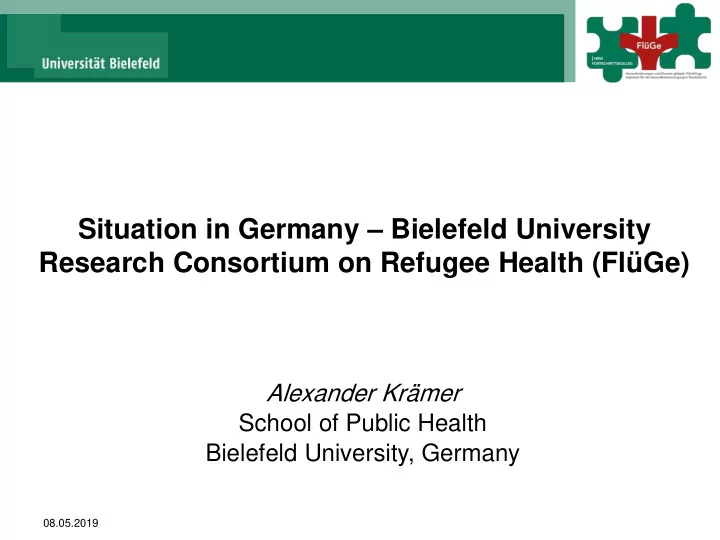

Situation in Germany – Bielefeld University Research Consortium on Refugee Health (FlüGe) Alexander Krämer School of Public Health Bielefeld University, Germany 08.05.2019
Development of asylum applications in Germany, 2014-2018* *only data for January and February available (BAMF, 2017) 08.05.2019 A. Krämer – Refugee Health 2
Asylum applications in Germany by country of origin, 2018 Syria, Arab. Republic 27% Others 26% Russian Federation… Iraq Unknown 3% 10% Somalia 3% Iran Eritrea 4% 7% Afghanistan 6% Nigeria 6% Turkey 6% (BAMF, 2019) 08.05.2019 A. Krämer – Refugee Health 3
Legal framework for health care of refugees in Germany Reception center Community accomodation Screening Basic individual medical care upon arrival §§ 2,4,6 AsylbLG (SGB XII) § 62 AsylG Screening for contagious Treatment of acute illnesses and pain, and of chronic diseases to diseases like pulmonary TB, prevent deterioration. Not covered: surgery that can be delayed, chickenpox, measles, scabies prothetic dental care, physiotherapy (exceptions upon request) Public Health Medicine (Vaccinations) 08.05.2019 A. Krämer – Refugee Health 4
Health care challenges of refugees in Germany • Health system not fully prepared for disease burdens (e.g. traumatisation, injuries) • Capacity limitations in pediatrics, psychotherapy and psychiatry, and emergency rooms (overuse) • Access barriers to medical care (restricting vouchers; reservation of some health care personnel) • Language and cultural barriers from both sides • Rejection of psychotherapy in spite of severe need from some refugees • Under- and overuse of health services 08.05.2019 A. Krämer – Refugee Health 5
Research needs for refugee health • Few representative studies for disease burdens • No longitudinal studies published • Research needs exist in the following fields: − Health care needs − Health care processes − Health care outcomes − Interdisciplinary research (beyond health sciences) − Transdisciplinary research (practice) 08.05.2019 A. Krämer – Refugee Health 6
Introduction FlüGe Research Center FlüGe - Opportunities and challenges that global refugee migration poses for health care in Germany • Based at Bielefeld University • Funded by the Ministry of Culture and Science of the German State North Rhine-Westphalia • Duration: 4.5 years: 08/2016 – 12/2020 • Inter- and transdisciplinary orientation • Multi-method approach 08.05.2019 Interdisciplinary Perspectives on Refugee Migration and Health 8
FlüGe: Interdisciplinary and transdisciplinary orientation 12 PhD students and 12 professors from 5 faculties at Bielefeld University • Faculty of Health Science • Faculty of Biology • Faculty of Psychology and Sports Science • Faculty of Law • Faculty of History, Philosophy and Theology Practice Partners in the region 08.05.2019 A. Krämer – Refugee Health 9
FlüGe: Scientific objectives Topic 1: Health status of refugees, identification of barriers to health care and development of interventions Gender and diversity Topic 3: Mixed methods Topic 2: Human rights Inter- and transdisciplinary Socio-economic and ethics, and health policy health equity in aspects of health the context of care for refugees flight and asylum 08.05.2019 A. Krämer – Refugee Health 10
11
Thank you very much for your attention! www.uni-bielefeld.de/fluege funded by: Prof. Dr. Alexander Krämer University of Bielefeld School of Public Health P.O. Box 100 131 33501 Bielefeld Mail: alexander.kraemer@uni-bielefeld.de
Recommend
More recommend